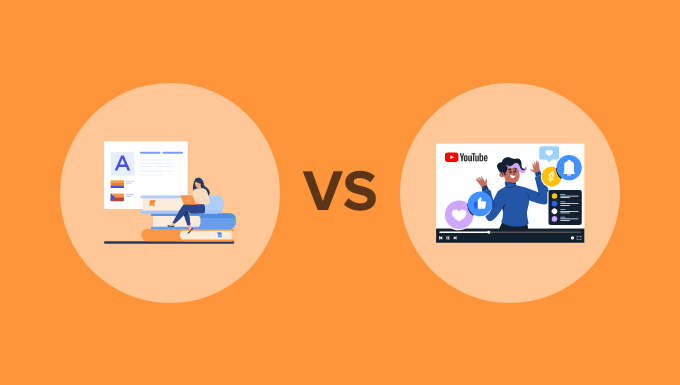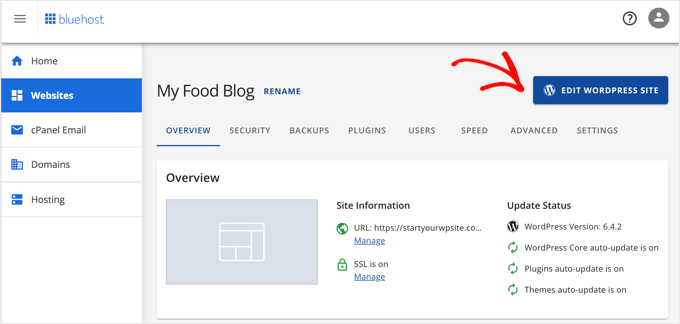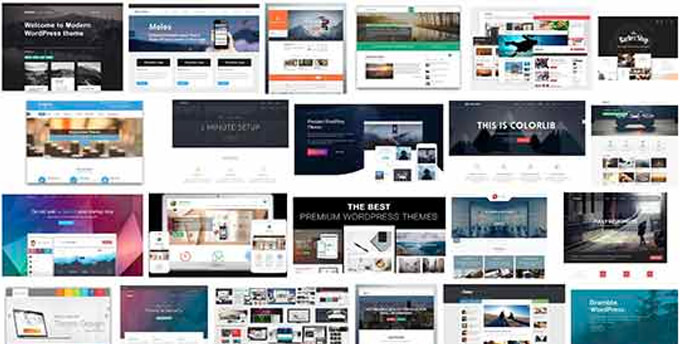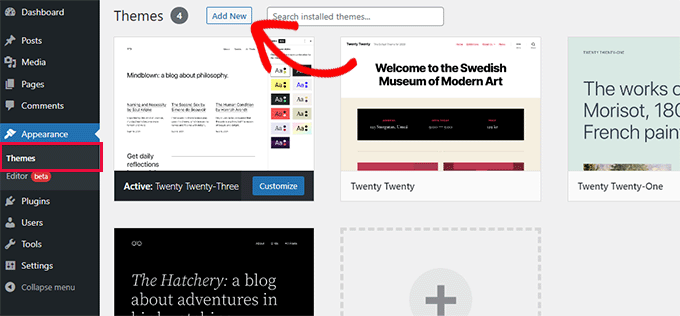At WPBeginner, we have built a massive audience through our WordPress blog and YouTube channel. We’ve witnessed the unique strengths and challenges of each platform.
As a result, our readers regularly ask which they should start first, a blog or a YouTube channel.
In this article, we will explain our pick of blog vs. YouTube and which one you should start with a detailed explanation of our take.

TLDR: We recommend you start with a blog and add a YouTube channel later if needed.
This is a comprehensive guide, so we’ve included a table of contents for easier navigation:
- What Is a Blog?
- Why Starting a Blog Is So Important Today
- Starting a Blog vs. Starting a YouTube Channel
- What You Need to Start a Blog
- Selecting a Theme to Customize Your Blog's Appearance
- Creating Your First Blog Post
- Extending and Growing Your Blog With Plugins
- Monetizing Your WordPress Blog
- Expert Guides on Integrating YouTube Videos With WordPress
What Is a Blog?
A blog is a type of website where articles, called ‘blog posts’, are presented in reverse chronological order, with newer content appearing first. Blog posts are a great way to share your expert knowledge with your audience, build credibility, and attract visitors to your site.
If you want to start an online business or communicate better with your existing customers or audience, then you should think about starting a blog.
Blogs typically present information in a conversational style and are run by individuals or a small group of people. However, there are now tons of corporate blogs that produce a great deal of useful informational and thought-leadership content.
Typical blog posts also have a comments section where users can respond to the article by making comments or asking questions.
Blogging has been around since 1993 and has become an essential marketing tool for many businesses. But is it still relevant in the age of YouTube and social media?
Why Starting a Blog Is So Important Today
There are currently 1.9 billion websites in the world, and over 600 million are blogs. That means that blogs make up a third of the web.
Blogging has become an important marketing strategy for businesses due to its benefits. You or your business can use a blog to promote ideas, brands, stories, products, and more.
Here are some of the more important benefits of blogging and why you should consider starting a blog.
1. A Blog Will Bring More Traffic to Your Website
A typical business website consists of a few important pages. For example, you may have a homepage, landing pages for your products and services, and a contact page.
Unfortunately, search engines may often decide that your website is less important than thousands of other websites in the same industry, especially if they have been around longer.
Adding a blog allows you to publish additional content, which, over time, will help you bring more traffic to your website.
That’s a major reason to start with a blog rather than a YouTube channel because YouTube videos will attract traffic to the YouTube platform instead of your own website. You own and control your blog, while the YouTube platform is owned by Google and will benefit them.
2. A Blog Will Help Strengthen Brand Recognition and Build Authority
A blog helps you strengthen your brand identity. It gives you more opportunities to use your custom logo across your website, your social profiles, search results, and more.
This brand recognition, when combined with customer trust and authority, adds enormous value to your digital assets.
Adding a blog allows you to establish authority by regularly publishing content on topics related to your industry.
If you are consistently publishing new content, you’ll become the go-to place for your users and other businesses interested in those topics.
3. A Blog Will Help You Generate More Leads and Conversions
More than 70% of people visiting your website today will never find it again. That’s because there is so much content and information on the internet.
Starting a blog will help you convert website traffic into potential leads, subscribers, and social media followers.
For example, you can use tools like OptinMonster to build an email list and grow a social media following. And with push notifications, you can send targeted messages to your blog visitors and bring them back to your website.
4. A Blog Will Help You Build an Engaging Audience
A static website doesn’t leave much room for a conversation. Why not add a blog to your site where users can engage by leaving a comment and sharing your posts on social media?
This helps you build a community around your business, which is extremely useful.
It will help your visitors develop a relationship with your brand, which pays off when they are looking to make a purchase or recommend your products and services to friends and family.
5. A Blog Will Let You Educate Customers and Share News
Blog posts allow you to educate customers about different ways they can use your products. This will allow you to compare your product with competitors, showcase product features, inform users about benefits, and more.
They’re also the best place to share your business news, announcements, and sales events.
For instance, if you are launching a Black Friday sale, you can promote it with a blog post. And then promote that blog post across your website with a floating header or footer banner.
6. A Blog Will Let You Build Additional Revenue Streams for Your Business
Blogs provide many opportunities to generate additional revenue and make money online. For instance, you can display ads in your blog posts using Google AdSense.
You can also promote affiliate products and make money with affiliate marketing or use your blog to sell premium content using MemberPress or Easy Digital Downloads.
7. A Blog Helps You Repurpose Content for Other Marketing Channels
Adding a blog to your website allows you to actively use blog content across your other marketing channels, such as making YouTube videos based on blog post content.
For example, we use our written WPBeginner tutorials as a helpful starting point for creating YouTube videos. This makes our video producers’ jobs easier and saves time. Then, we embed the YouTube videos into the tutorial so our visitors can choose to read or watch the content.
Still not convinced? You can learn even more reasons to start a blog by taking a look at our article on the benefits of blogging.
Starting a Blog vs. Starting a YouTube Channel
Now that you know about some of the benefits of blogging, you can see why we recommend that you start a blog first and then add a YouTube channel in the future if you need to.
Let’s summarize the most important points. When you build a blog, you are creating a platform that you own and control. The content you create will attract visitors to your website, where they can learn more about your products and services.
On the other hand, the YouTube platform will always be owned by Google. The search traffic generated by your content will take people to the YouTube website, not your own.
Creating blog posts first also makes it easier to create other types of content, such as YouTube videos. Usually, the first step in creating a video is to write a script. Because you have already created written content on your blog, a lot of the work is already done.
Besides that, creating YouTube videos requires expensive equipment, such as a camera and lighting, and you’ll also need to purchase video editing software and learn how to use it.
Finally, your blog is the perfect place for your visitors to watch your YouTube videos. You can easily embed YouTube videos in a blog post, giving your visitors the choice of watching or reading your content. That’s a great user experience.
What You Need to Start a Blog
We know that starting a blog can be a terrifying thought, especially when you are not geeky. Guess what – you are not alone.
If you want to start a blog, then WordPress is the most popular blogging platform recommended by experts.
Although WordPress is free, there are some costs involved in creating a self-hosted blog. You will need to choose and register a domain name and decide on a web hosting provider.
You may also want to pay someone to design your website and purchase premium plugins to add features. The total cost will depend on your needs and goals.
The good news is that you can build a fully functional WordPress website for yourself and keep your costs under $100. Bluehost, an official WordPress-recommended hosting provider, has agreed to offer our users a free domain name and over 61% off on web hosting.
You can learn the details and options in our guide on how much it really costs to build a WordPress website.
Even better, when you sign up with Bluehost using our link, they will automatically install WordPress for you, so you can start building your blog right away.
All you need to do is log in to your Bluehost account and then click the ‘Edit WordPress Site’ button to get started.

After that, you will need to set up your WordPress install, choose a theme and some plugins, and then get started on your first blog post.
We take you through the entire process step by step in our beginner’s guide on how to start a WordPress blog. We will summarize the main steps below.
The end result will be an attractive and functional blog that you own.
Selecting a Theme to Customize Your Blog’s Appearance
Customizing the look and feel of your blog is by far one of the most exciting and rewarding parts of the journey of creating your WordPress blog.
WordPress comes with a powerful templating engine that allows you to change the appearance of your website by installing themes.
There are thousands of free and paid WordPress themes available. You can choose one that looks closer to what you have in mind for your website.

You can look for themes on the Appearance » Themes page. It will show you a bunch of default themes that come with your WordPress install.
For more themes, click on the ‘Add New’ button at the top to find more free themes.

For premium or paid WordPress themes, you can try trusted WordPress theme shops like SeedProd, Thrive Themes, Astra, Elegant Themes, and more.
However, there is such an abundance of WordPress themes that it may become difficult for beginners to decide which theme they want to use.
We recommend choosing a minimalist design with plenty of white space. This provides you plenty of room to customize the theme and make it your own.
For more details, see our guide on how to choose the perfect theme for your website, as well as our list of the best free WordPress blog themes.
Creating Your First Blog Post
Once you have selected your WordPress theme, you are now ready to create your first blog post. You just need to click on the Posts » Add New menu in your WordPress dashboard.
You will see an editor area where you can write your first blog post.

WordPress uses a block-based editor that allows you to create beautiful content layouts for your blog posts.
To familiarize yourself with the editor, see our WordPress block editor tutorial.
Once you are done writing, go ahead and click on the ‘Publish’ button in the top-right corner of the screen to make your blog post publicly available.

On the posts screen, you will notice several other sections, such as Categories and Tags. You can use these to organize your blog posts into sections. We have a great write-up on the difference between categories vs. tags, which we highly recommend that you read.
To utilize all the features on the posts screen, you should read our article on how to add a new post in WordPress (video included).
We also offer some helpful resources to help you brainstorm new post ideas to write about:
- Free blog post idea generator tool
- Blog post ideas that your readers will love
- Types of blog topics that are proven to work
- How to write a great blog post (structure + examples)
A lot of pro bloggers choose their specific topics strategically by doing keyword research. This helps their content rank higher in Google searches and get more traffic.
We have a step-by-step guide on how to do keyword research for beginners using the exact same method that we use on WPBeginner.
Extending and Growing Your Blog With Plugins
Once you publish your first blog post, you’ll probably want to get started with adding other usual elements on your website, such as a contact page, galleries, sliders, and an email list. To add all these additional features, you need to use plugins.
Plugins are like apps for your WordPress website. They allow you to add new features and extend the functionality of WordPress without writing any code.
There are more than 60,000 free plugins available in the WordPress.org plugin directory alone. Plus, there are premium WordPress plugins sold by third-party developers with priority support and guaranteed updates.

However, you also need to consider which plugins you need to use to keep your WordPress website secure, private, and anonymous.
Here are our top picks of the best plugins to grow your blog:
- All in One SEO is the best WordPress SEO plugin on the market and helps your anonymous website get more traffic from search engines.
- SeedProd is a powerful WordPress page builder that allows you to use a drag-and-drop interface to create any type of page for your website.
- MonsterInsights is the best WordPress Google Analytics plugin that helps you see where your visitors are coming from and what they see on your website.
- OptinMonster is a conversion optimization software that helps you convert website visitors into email subscribers and customers.
- WPForms is the best WordPress contact form plugin and allows you to easily create forms for your website.
That’s just a start. You can learn how to add plenty of other features to your blog by checking out our list of useful tools to manage and grow your WordPress blog.
Monetizing Your WordPress Blog
WordPress is the largest publishing platform on the planet, and it powers over 43% of all websites. Many bloggers have successfully monetized their blogs, and you can, too.
That’s why we put together a detailed list of proven ways you can make money online blogging with WordPress.
Unlike other articles on how to make money online, this is a comprehensive guide on how to make money at home legitimately using blogging and WordPress.
Many of these methods require some investment of time and money to get started. As long as you are willing to put in the effort, you’ll reap the reward.
Here are some of the main strategies we cover:
- Displaying Google AdSense ads
- Selling ads
- Affiliate marketing
- Offering members-only content
- Selling digital products
- Selling physical products in an online store
Expert Guides on Integrating YouTube Videos With WordPress
We hope this tutorial helped you learn why you should start with a blog instead of a YouTube channel. You may also want to see some tutorials on how to integrate YouTube videos into your WordPress blog:
- How to Start a Successful YouTube Channel for Your Business
- How to Easily Embed Videos in WordPress Blog Posts
- How to Embed a YouTube Playlist in WordPress (Best Method)
- How to Embed a YouTube Live Stream in WordPress
- How to Automatically Create WordPress Post from YouTube Video
- How to Show Latest Videos From YouTube Channel in WordPress
- Best YouTube Video Gallery Plugins for WordPress
- How to Add YouTube Subscribe Button in WordPress
If you liked this article, then please subscribe to our YouTube Channel for WordPress video tutorials. You can also find us on Twitter and Facebook.





Oyatogun Oluwaseun Samuel
Starting a blog or YouTube channel require passion, consistency, and patience. I think one should consider leveraging both platforms to reach a wider audience! Blogging excels at in-depth guides and SEO, while YouTube shines with visual storytelling and community engagement.
kzain
Blogging has become a real passion for me! After a year and a half with my blog, it’s fascinating to see the traffic grow and the community that’s formed around it. But one of the biggest benefits for me has been the learning experience. Blogging pushes you to delve deeper into your chosen topics, which has not only expanded my knowledge of WordPress but also the subjects I write about in personal finance.
Dennis Muthomi
I have been blogging for a while and recently ventured into YouTube, I can see value in both platforms.
Well, each platform offers unique learning experiences and growth opportunities.
Blogging has taught me content creation and SEO, while YouTube is helping me develop video production skills.
YT is also opening up new avenues for creativity and reach
Jiří Vaněk
Exactly, every platform has its own merits. In general, I see blogging as a great form of presentation for introverts. After all, being an influencer on YouTube requires a relatively high degree of extroversion and isn’t suitable for everyone. Personally, I’d enjoy having a YouTube channel much more, partly due to monetization, but since I’m not explicitly an extrovert, I only have video tutorials there. But as you said, each platform finds its own users.
Jiří Vaněk
The blog is an amazing thing. I have my own as well, and after almost a year and a half, it’s sometimes fascinating to observe the traffic. Personally, I consider what I’ve learned as a huge positive from the blog. Not only about WordPress but also about the topics I write about. It pushes you to first look into the given topic and study it better. So, for me, the advantages of a blog are clear – it teaches you many things and eventually improves your writing and style significantly.
Moinuddin Waheed
I think starting a blog and a YouTube channel both is important as both compliment each other in growing audience and buisness.
The sure shot to increase the traffic to blog is making a YouTube channel for the same niche and start creating content around the same. it leads the traffic from YouTube to the blog and blog to the YouTube.
It also creates a branding in that niche.
Thanks for making detailed discussion around this. This is very helpful and insightful.
WPBeginner Support
You’re welcome, glad you found our article helpful
Admin
Martin Steve
I appreciate your post, brought new confidence to me
WPBeginner Support
Glad our post was helpful!
Admin